
April 28-29: The Special Administration of Macau is Las Vegas in China. The city may be synonymous with gambling, but its landmark is a crumbling relic of imperial Portugal - the Ruins of St. Paul’s. The Cathedral of St. Paul was built at the end of the 16th century (more than a century before Britain secured a foothold in Hong Kong). The cathedral burnt down during an 1835 typhoon, and the remains provide Mainland tourists a backdrop to the same classic tourist snapshots that Notre Dame or the Eiffel Tower might offer in Paris. We take the obligatory self-portrait at St. Paul’s and visit the nearby Fortaleza de Monte.
Free shuttles run from most hotels and all casinos. We booked the Metrople Hotel at a travel agent near the Turbo Jet ticket counter for a discount - although I’m not sure about the savings. For the record, we paid $900 HK for two nights (just over $100 US). A form behind the door listed a price higher than $1,000 per night.
Joyce returns to Hong Kong, and I head to Taipa and Cologne (islands south of Maccau that have been joined by reclaimed land). A free shuttle crosses the bridge to the Crown casino, and a $2.50 bus fare takes me to the base of Coloane Hill. A-Ma Cultural Village and Tian Hou Palace near the summit of the 560-ft. hill.


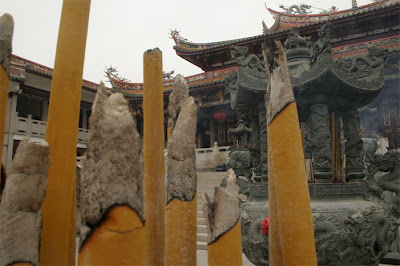
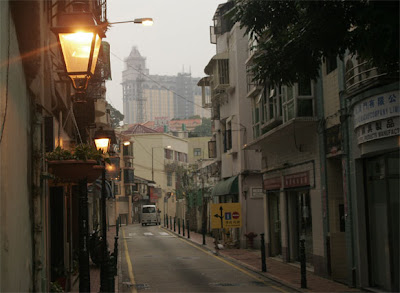
Today, April 28, is the birthday of Tin Hau – also known as A-Ma. The goddess of the sea or “Queen of Heaven” is especially revered in Macau and surrounding areas (including Hong Kong). According to the Macau Government Tourism Office, “Legend has it that centuries ago the goddess, posing as a Fujian girl, saved several fishermen from a raging tempest off the coast of China, in gratitude for which the survivors built the famous A-Ma Temple.”
The village at Alto de Coloane is actually an enormous Qing-era temple and courtyard devoted to A-Ma (or Tin Hau) Inside, a group of women bang gongs and sing sporadically. Worshippers light firecrackers on the side of the temple. Giant incense sticks (more like logs) burn in front of the regular incense burners.
Nearby, at the hill’s highest point, an enormous white statue to A-Ma looks across the island.
A free shuttle transports tourist up and down the hill every 30-minutes, but you can hike up (about 30 min.). I choose to hike up. For the sake of time, I’d recommend the free shuttle to the top, and hiking down. I take the shuttle down.
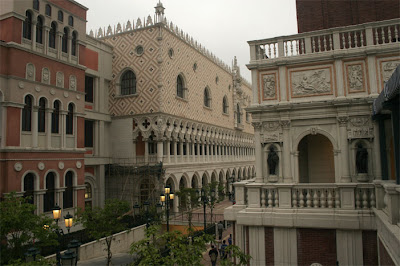
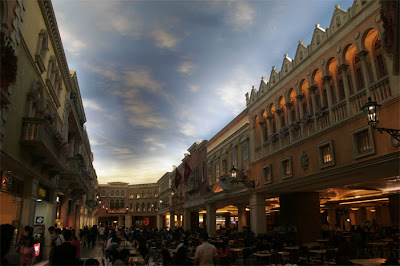

Another $2.50 bus. Taipa Village offers the cobblestone sidewalks of a displaced European village, surrounded by towering residential complexes and casinos. I wander then walk to the Venetian, the world’s third largest building at 10.5 million sq. ft. (after the Netherlands’ Aalsmeer Flower Auction and Beijing Capital International Airport).
The Venetian is huge. Canals snake about both outside and inside. Gondoliers sing under an artificial sky as families peruse fancy boutiques. The gaming floor stretches as if falling off either horizon. Even the food court is modeled after an Italian square beneath a constantly azure sky. The casino shuttle takes me back to the ferry pier, where another shuttle takes me back to the Macau city center. I walk to the far west of the island, to visit the A-Ma temple supposedly built by the fisherman saved by the goddess.
The temple hosts a Cantonese opera in a make-shift bamboo structure. The practice is common throughout the region in Hong Kong and Guangdong Province. At the back of the theatre, close to the ceiling, an altar to A-Ma (Tin Hau) allows the goddess to view the performance in her honor.
Another bus ride, and I’m near Senado Square again. I return to the Metrople and stop at the Portuguese restaurant across the street. Macau is popular for food tourists from Hong Kong. Shamefully, I have only $110 HK in my wallet, $7 has already gone to bus fare and $95 goes for a Portuguese baked fish. The meal is amazing. The fish is baked with gobs of onions, tomatoes and green peppers atop a potato shelf, all doused in olive oil, with a single green olive on the side.

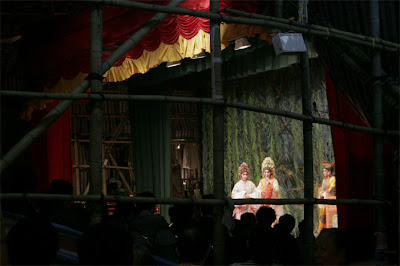



The next morning, I return my room key for a $200 HK deposit. I wander the island more, walking till my legs ache. I eat a pastry, drink a Pocari Sweat (essentially Japanese Gatorade).Ready to crash (and eat) I use the deposit money to buy the $142 return ticket. After a short nap on the boat, I’m home for an early dinner.


No comments:
Post a Comment